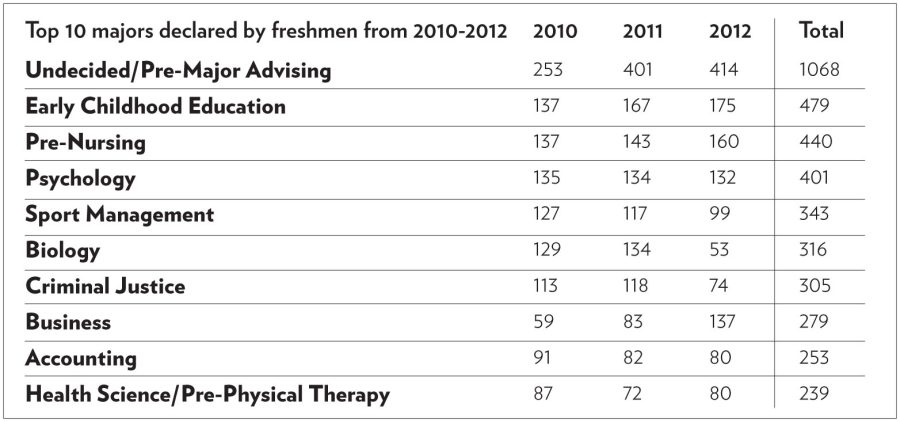Freshman Ben Zauski plans to make a living someday by using statistical analysis to forecast the future.
So when analyzing this year’s incoming class, the statistics major isn’t surprised he is an outlier in the data set.
“Very few people go into math-oriented fields,” Zauski said. “It’s not one of those majors you can switch into easily.”
Zauski is one of three statistics majors out of nearly 4,000 freshmen who started attending the University this fall.
He’s got a knack for numbers and hopes to apply it to actuarial science, assessing risk in insurance and finance industries.
“It’s an area that’s projected to see a lot of job growth,” Zauski said. “It definitely takes a numbers person and since that’s what attracted me to it, I’m sticking with it. I’m very happy with it.”
The University offers freshmen more than 200 majors to choose from when they send in their applications.
But like statistics, dozens of majors claim only a few freshmen each fall, said Gary Swegan, assistant vice president for enrollment management and director of admissions.
Many factors determine a major’s popularity — not necessarily just employment opportunities and salaries, Swegan said.
“Majors at the top of the list are usually things students are commonly exposed to and know something about,” he said. “It could be what your parents do, something you see in the media or something you’ve encountered in your life.”
Junior Tyler Pendleton, a psychology major, said Swegan’s theory is spot-on.
Pendleton — one of 135 freshmen who declared a psychology major in 2010 — hopes to someday work as a clinical psychologist and treat mental disorders.
He began studying psychology for two reasons: he used a psychologist to treat a sleep disorder during childhood and he saw the field portrayed on the popular television show “Criminal Minds.”
“I think if you can relate to a major, that makes it appealing and popular — if it resonates with you,” Pendleton said. “It’s not uncommon for psychology majors to have had positive personal experiences with the practice.”
In addition to psychology, other common majors for freshmen in the past three years include early childhood education, pre-nursing, sport management and biology.
But the major most freshmen pick might actually be the most unpopular choice for those paying their tuition.
“Undecided is always No. 1 and that’s pretty standard nationwide,” Swegan said. “More students than not also end up changing their major at least once before they graduate. That’s across the board as well.”
Uncommon majors for freshmen include ethnic studies, dance, microbiology, theatre and foreign languages.
But narrowing down the list of least popular majors is difficult, since so many majors enroll only a handful of students, Swegan said.
“Once you get further down the list, you start to see a precipitous drop because these things aren’t as familiar to a typical 17- or 18-year old,” he said.
Although some people might conclude unpopular majors should be eliminated, such assumptions are hasty, Swegan said.
Many classes for majors with low subscribers, such as economics or women’s studies, fulfill general education requirements for all University students.
“It’s a lot more complicated than concluding, ‘this major has few students, let’s get rid of it,’” Swegan said. “Faculty for these majors service the entire campus. Often these majors are also discovered later on after students are exposed to these courses.”








